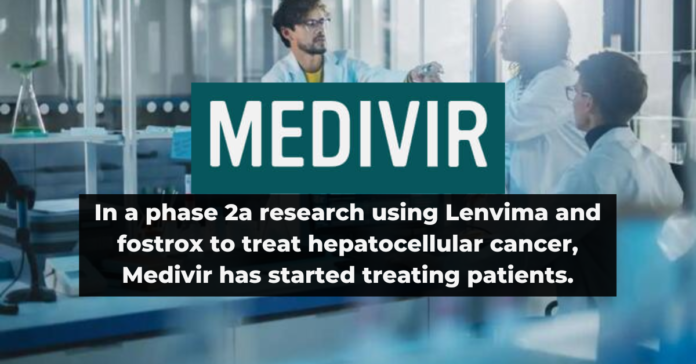The first patient with hepatocellular carcinoma (HCC) has begun treatment in phase 2a with the candidate drug fostroxacitabine bralpamide (fostrox) in combination with Lenvima, according to Medivir AB, a pharmaceutical company dedicated to creating novel cancer treatments in regions with a high unmet medical need. In the ongoing phase 1b/2a research by Medivir, fostrox is administered along with either Lenvima, a tyrosine kinase inhibitor, or Keytruda, an inhibitor of the PD-1 checkpoint. Patients with HCC whose first- or second-line treatment has been ineffective or intolerable are included in the open-label, multicenter research. The phase 1b portion of the study evaluates the ideal fostrox dose for the following phase. This dose is subsequently utilised in phase 2a of the trial, which is when safety and effectiveness signals are further assessed.
Early findings from the recently finished phase 1b study for fostrox combined with Lenvima were encouraging, with a good safety and tolerability profile and no evidence of dose-limiting toxicity. In this combination arm, 30 mg of fostrox was the recommended starting dose (RP2D). The fact that we were able to begin the crucial expansion phase of the trial so swiftly and that the first patient is currently receiving fostrox and Lenvima treatment in phase 2a is quite encouraging. According to Pia Baumann, chief medical officer of Medivir AB, “There is a great medical need for a novel, effective treatment, and there is a great interest from both investigators and patients, therefore I believe that the recruitment of patients to this section of the trial will be finished promptly.
Ongoing new developments for fostrox will be based on the findings of this study. Up to 30 HCC patients might potentially be enrolled in the trial, which is being carried out at 14 clinics in South Korea, Spain, and Great Britain. The phase 1b dose escalation is still going on in the second combination arm, which uses fostrox and Keytruda. Fostrox is a pro-drug created to target liver malignancies specifically and reduce adverse effects. It could be the first medication that targets the liver and is taken orally by people with HCC and other types of liver cancer. A phase 1b monotherapy study of Fostrox has been completed, and a combination study in HCC is now ongoing.
Hepatocellular carcinoma (HCC), the most frequent cancer to develop in the liver, is the third most common cause of cancer-related deaths globally. Despite severe HCC patients may live longer with current medicines, therapeutic success is limited and mortality rates are still high. In the US, primary liver cancer affects 42,000 people a year, and the five-year survival rate is currently 11%. HCC lacks the distinguishing mutations seen among numerous other malignancies, making it a heterogeneous illness with a variety of aetiologies. This has led to the molecularly targeted medicines’ failure to treat HCC. There is a significant unmet medical need as a result of the modest overall benefit and the dismal overall prognosis for patients with intermediate and advanced HCC.
With a focus on cancer, a disease with significant unmet medical needs, Medivir creates novel medications. The therapeutic candidates are targeted at indications where there are few or no existing medicines and where there are strong prospects to provide patients with significant improvements.




